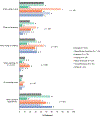Reported Intergenerational Transmission of Parent Weight Talk and Links with Child Health and Wellbeing
- PMID: 38494088
- PMCID: PMC11176000
- DOI: 10.1016/j.jpeds.2024.114012
Reported Intergenerational Transmission of Parent Weight Talk and Links with Child Health and Wellbeing
Abstract
Objectives: To examine if intergenerational transmission of parent weight talk occurs, the contextual factors prompting weight talk, and whether parent weight talk is associated with child weight, dietary intake, psychosocial outcomes, and food parenting practices.
Study design: Children aged 5-9 years and their families (n = 1307) from 6 racial and ethnic groups (African-American, Hispanic, Hmong, Native American, Somali/Ethiopian, White) were recruited for a longitudinal cohort study through primary care clinics in Minneapolis/St. Paul, Minnesota from 2016 through 2019. Parents filled out surveys at 2 time points, 18 months apart. Adjusted regression models examined associations of interest.
Results: Intergenerational transmission of parent weight talk was observed. In addition, significant associations were found between parent engagement in weight talk and higher weight status and poorer psychosocial outcomes in children 18 months later. Parent engagement in weight talk was also associated with more restrictive food parenting practices 18 months later.
Conclusions: Parents' exposure to weight talk as children increased the likelihood of engaging in weight talk with their own children and had harmful associations over time with parent restrictive feeding practices, child weight, and psychosocial wellbeing in children. Health care providers may want to consider both modeling positive health-focused conversations and educating parents about the potential harmful and long-lasting consequences of engaging in weight talk with their children.
Keywords: dietary intake; food parenting; obesity; psychosocial wellbeing; weight conversations.
Copyright © 2024 Elsevier Inc. All rights reserved.
Conflict of interest statement
Declaration of Competing Interest The authors have no conflicts of interest relevant to this article to disclose.
Figures


Similar articles
-
Parental weight perception and non-responsive feeding practices in Chinese preschoolers: a prospective longitudinal study.Eur J Pediatr. 2025 Aug 8;184(9):538. doi: 10.1007/s00431-025-06361-9. Eur J Pediatr. 2025. PMID: 40779227 Free PMC article.
-
Parent training interventions for Attention Deficit Hyperactivity Disorder (ADHD) in children aged 5 to 18 years.Cochrane Database Syst Rev. 2011 Dec 7;2011(12):CD003018. doi: 10.1002/14651858.CD003018.pub3. Cochrane Database Syst Rev. 2011. PMID: 22161373 Free PMC article.
-
Can it be harmful for parents to talk to their child about their weight? A meta-analysis.Prev Med. 2016 Dec;93:135-146. doi: 10.1016/j.ypmed.2016.10.010. Epub 2016 Oct 14. Prev Med. 2016. PMID: 27746340
-
Parent training interventions for parents with intellectual disability.Cochrane Database Syst Rev. 2018 Jul 13;7(7):CD007987. doi: 10.1002/14651858.CD007987.pub3. Cochrane Database Syst Rev. 2018. PMID: 30004571 Free PMC article.
-
Family-centred interventions for Indigenous early childhood well-being by primary healthcare services.Cochrane Database Syst Rev. 2022 Dec 13;12(12):CD012463. doi: 10.1002/14651858.CD012463.pub2. Cochrane Database Syst Rev. 2022. PMID: 36511823 Free PMC article.
Cited by
-
Parental Weight Stigma Associated with Self-Directed Weight Talk and Use of Health-Related Restrictive Feeding Practices.J Acad Nutr Diet. 2025 Jan 21:S2212-2672(25)00021-8. doi: 10.1016/j.jand.2025.01.012. Online ahead of print. J Acad Nutr Diet. 2025. PMID: 39848579
References
-
- Berge JM, Hanson-Bradley C, Tate A, Neumark-Sztainer D. Do parents or siblings engage in more negative weight-based talk with children and what does it sound like? A mixed-methods study. Body Image [Internet]. 2016;18:27–33. Available from: http://linkinghub.elsevier.com/retrieve/pii/S1740144515300462 - PMC - PubMed
MeSH terms
Grants and funding
LinkOut - more resources
Full Text Sources
Medical

